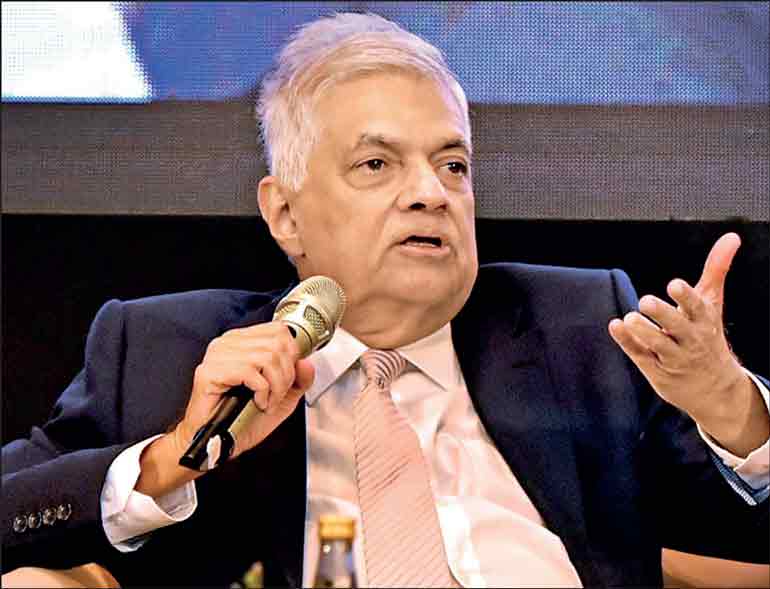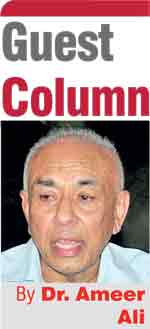Tuesday Feb 17, 2026
Tuesday Feb 17, 2026
Wednesday, 28 December 2022 00:02 - - {{hitsCtrl.values.hits}}

What makes RW believe that a bunch of politicians including himself, who had enjoyed the benefits of ethnonationalism for decades would now change their minds and contribute to a solution that would permanently deprive them of those benefits?

“Paci vanthidap paththum paranthu pom”, are the immortal words from the grand old lady of Tamil poetry, Awwai, who lived sometime during the Sangam era (600 BCE-300 CE), which simply means that when hunger pervades, all 10 features of humanity would evaporate and disappear. According to her, those features were, a sense of shame (maanam), caste consciousness (kulam), education (kalvi), strength (vannmai), intelligence (arivudamai), philanthropy (thaanam), religious faith (thavam), personal status (uyarchchi), jealousy (thaalaanmai) and sexual lust (kaamam).
Of this list, the second element of caste consciousness could be interpreted broadly to include communal consciousness, which in the context of present Sri Lanka is most appropriate. Isn’t communalism or ethnonationalism the bane of this country and the underlying cause for the economic disaster experienced now?
It is therefore not unreasonable to argue that it is the agony and horror of economic misery and hunger caused by financial bankruptcy and collapse of the economy that appear to have melted the hearts of hardline Sinhala-Buddhist ethnonationalists to allow President Ranil Wickremesinghe to proceed with his initiative to find permanent solution to the decades-old national question. That there is also added pressure from international community and institutions that want an early resolution to this vexed question before extending economic and financial assistance, strengthens RW’s urgency. To his credit therefore, he has chosen the right time to bring the national question to the centre stage of public discussion. But will he succeed is the sixty-four thousand dollars question.
While targeting the centenary year 2048 for realising his economic dream of transforming Sri Lanka into a technologically advanced and export-oriented economic paradise competing and hobnobbing with members of the First World family, he has now set the 2023 Independence Day, to resolve the national question. And to start the ball rolling, he called the leading members of all political parties that are represented in the parliament for their constructive proposals and contributions. Although it was only a preliminary step along a difficult journey, it was regrettable that JVP of all parties, which should have taken the lead in those deliberations, decided to keep away from them. Why its leaders took that decision is mind boggling to say the least and the party owes a plausible explanation to the public.
However, from what could be gleaned from published reports the immediate reaction to RW’s opening salvo, seems to be one of cautious optimism. Except for a couple of dissenting voices from one or two recalcitrant parliamentarians, even the usual suspects from the saffron army who would have normally fired the first shot against any move towards reconciliation with Tamils has surprisingly kept their silence. Is this a sign of blessing or calm before a storm?
Be that as it may, the entire stature and content of the national question has changed substantially from its initial days, when the focus was solely on the Tamil community and that too minus its upcountry segment. Today, and since 2009, with Muslims and upcountry Tamils raising their own grievances against Sinhala-Buddhist majoritarianism, and being led by their own set of leaders, the so-called Tamil National question has metamorphosed into a Minorities National question. This tripartite division within the minorities and their conflicting demands would certainly provide opportunities to hardliners from the majority community to divide and rule. That may be one of the reasons for the muted opposition so far to RW’s reconciliation initiative. Or, it may be and as indicated earlier, people are so preoccupied with the daily struggle of feeding, clothing and shelter that they do not care what happens to the national question.
But the real difficulty in finding any solution to the ethnic issue lies in the politics surrounding it. What makes RW believe that a bunch of politicians including himself, who had enjoyed the benefits of ethnonationalism for decades would now change their minds and contribute to a solution that would permanently deprive them of those benefits? Isn’t it like asking for advice from a robber to stop a robbery?
The ethnic issue was engineered by politicians for reasons of political power and with support from ethnonationalists, particularly from the Sinhala-Buddhist variety. The capture and maintenance of that power later became an avenue for accumulating personal wealth and prestige under the cover of national development. The constitutions that were designed from time-to-time ennobled ethnonationalism, and provided its upholders with social licensing to do whatever they liked and in the manner they liked. All state machineries including the judiciary were subjugated to serve the needs of politicians. There was no accountability, except at periodic polls in which the same ethnonationalism decided the victor.
Ethnonationalism is part of the ‘system’ and that ‘system’ continued for decades until a new generation of awakened youth called for ‘systemic change’. Now, having denied such a radical change and taken precautions to prevent any recurrence of such a demand, RW wants the same politicians to find solution to eradicate permanently an ideology that benefited them immensely for decades. Will they genuinely concede to his demand or plan their own countermoves to sabotage his initiative only time would tell.
Had RW been sincere in his determination to resolve the national question he should have formed a partnership with that youth group which began its aragalaya with an a-political and a-ethnic stamp. This author will continue to argue that this was a missed opportunity caused by a total misunderstanding of the real thinking and motivations of a new generation of young men and women in this country. This is a generation that is in constant touch with its counterparts in the rest of the world and realises how the world outside is responding to the creative thoughts and demands of its members. This intergenerational global divide with political implications, and the need for a gender balanced and intergenerational parliament in this country to tackle issues like the Minorities National Question is still not well understood by RW and his political team.
On a different occasion the CBSL Governor Dr. Nandalal Weerasinghe stressed the point that with or without IMF medium and long-term reforms are an absolute necessity to pull the country out of its mess. Resolving the national question permanently requires more than a short-term effort and involves radical ‘systemic change’. It has to be at least part of a medium-term reform agenda.
That agenda requires popular support and the new generation of young men and women is the vehicle that could work to generate that support. By suppressing the Aragalaya movement with force, RW missed an opportunity to solicit the backing of this generation in undertaking fundamental reforms that would change the ‘system’ and help ethnic reconciliation efforts. His olive branch at the Royal is too little and too late. He is now forced to turn to his own kind in the parliament for help.
The resolution requires statesmanship on both sides, which is sadly in absence. It therefore needs the involvement of an elite of patriotic and humanist negotiators with Chanakya talent to settle this question. The new generation is intelligent enough to rally behind such a group. Such talented people are available in the community but they are outside politics. By not picking them and leaving negotiations to politicians RW has shot his foot.
(The writer is attached to Murdoch Business School, Murdoch University, W. Australia.)